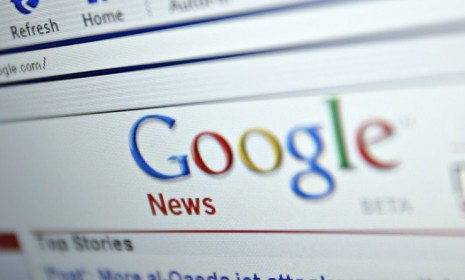Google's new privacy policy: 'Evil'?
The search giant will soon begin sharing your personal data across almost all of its services — a violation, critics say, of Google's "don't be evil" ethos

A free daily email with the biggest news stories of the day – and the best features from TheWeek.com
You are now subscribed
Your newsletter sign-up was successful
Google is changing its privacy policies to allow the sharing of a user's data across 60 of its web services, including Gmail, YouTube, and personalized search (but not Google Wallet, Google Books, or the Chrome browser). For example, says Brent Rose at Gizmodo, "if you searched for 'Furbies' on Google's homepage (for some freaky reason) and then later went to YouTube, you might see Furbies videos pop up. That's new. Previously, data was compartmentalized between applications." Privacy advocates and many tech commentators aren't happy, especially because there's no way to opt out of the cross-Google data sharing. Does this change violate Google's "don't be evil" philosophy?
Yes. Google is turning evil: Google claims that this change better serves its users, but really, but I think it's really all about selling more targeted ads, says Mat Honan at Gizmodo. Come March 1, "things you could do in relative anonymity today will be explicitly associated with your name, your face, your phone number," and everything else you put in Google's hands. I'm "calling this evil" because Google is violating the core promise of respecting its users — a promise that Google used to "get us all under its feel-good tent."
"Google's broken promise: The end of 'don't be evil'"
The Week
Escape your echo chamber. Get the facts behind the news, plus analysis from multiple perspectives.

Sign up for The Week's Free Newsletters
From our morning news briefing to a weekly Good News Newsletter, get the best of The Week delivered directly to your inbox.
From our morning news briefing to a weekly Good News Newsletter, get the best of The Week delivered directly to your inbox.
C'mon. People are overreacting: This "internet freakout" mostly shows that "no one actually reads privacy policies," says Kashmir Hill at Forbes. We have all given Google permission to share our information among Google services since 2005. The only change is that now it will actually use all that stuff it knows about you to, say, recommend YouTube videos. "When Google starts bundling everything it knows about its users and selling that to insurance companies, background check companies, and the Department of Homeland Security, that's when I'll trot out the 'evil label.'" For now, "kudos to them for being so explicit" about their privacy tweaks.
"Internet freakout over Google's new privacy policy proves..."
The real issue is Google's ambitions: Of course Google isn't evil, says Adam Pash at Lifehacker. "But it's never been harder to take their famous 'Don't be evil' motto seriously." Google started out wanting to give us the web, then get out of the way. Now it "wants to grab every piece of the internet you use," trying for "world domination" like Facebook or, more damningly, 1990s-era AOL. That's not the Google we came to love, and it's "a fantastic bummer" for anyone who likes a free, innovative web.
"Google is Facebook is AOL: What happens when a Good Google goes bad"
A free daily email with the biggest news stories of the day – and the best features from TheWeek.com
-
 Quentin Deranque: a student’s death energizes the French far right
Quentin Deranque: a student’s death energizes the French far rightIN THE SPOTLIGHT Reactions to the violent killing of an ultra-conservative activist offer a glimpse at the culture wars roiling France ahead of next year’s elections.
-
 Secured vs. unsecured loans: how do they differ and which is better?
Secured vs. unsecured loans: how do they differ and which is better?the explainer They are distinguished by the level of risk and the inclusion of collateral
-
 ‘States that set ambitious climate targets are already feeling the tension’
‘States that set ambitious climate targets are already feeling the tension’Instant Opinion Opinion, comment and editorials of the day